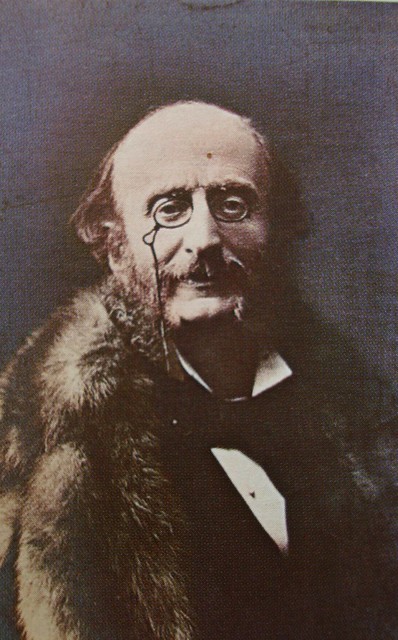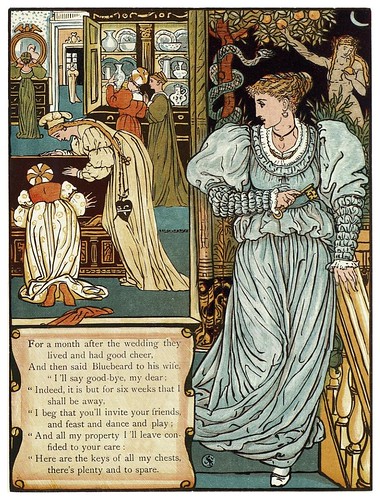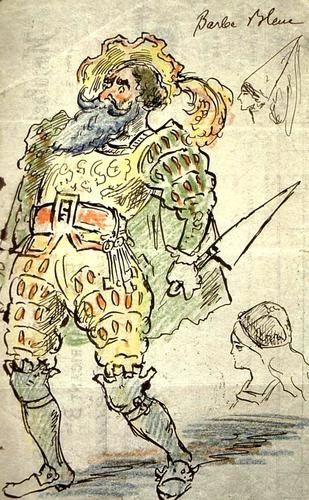"If one plays good music, people do not listen,
and if one plays bad music people do not talk."
AUTHOR: Oscar Wilde
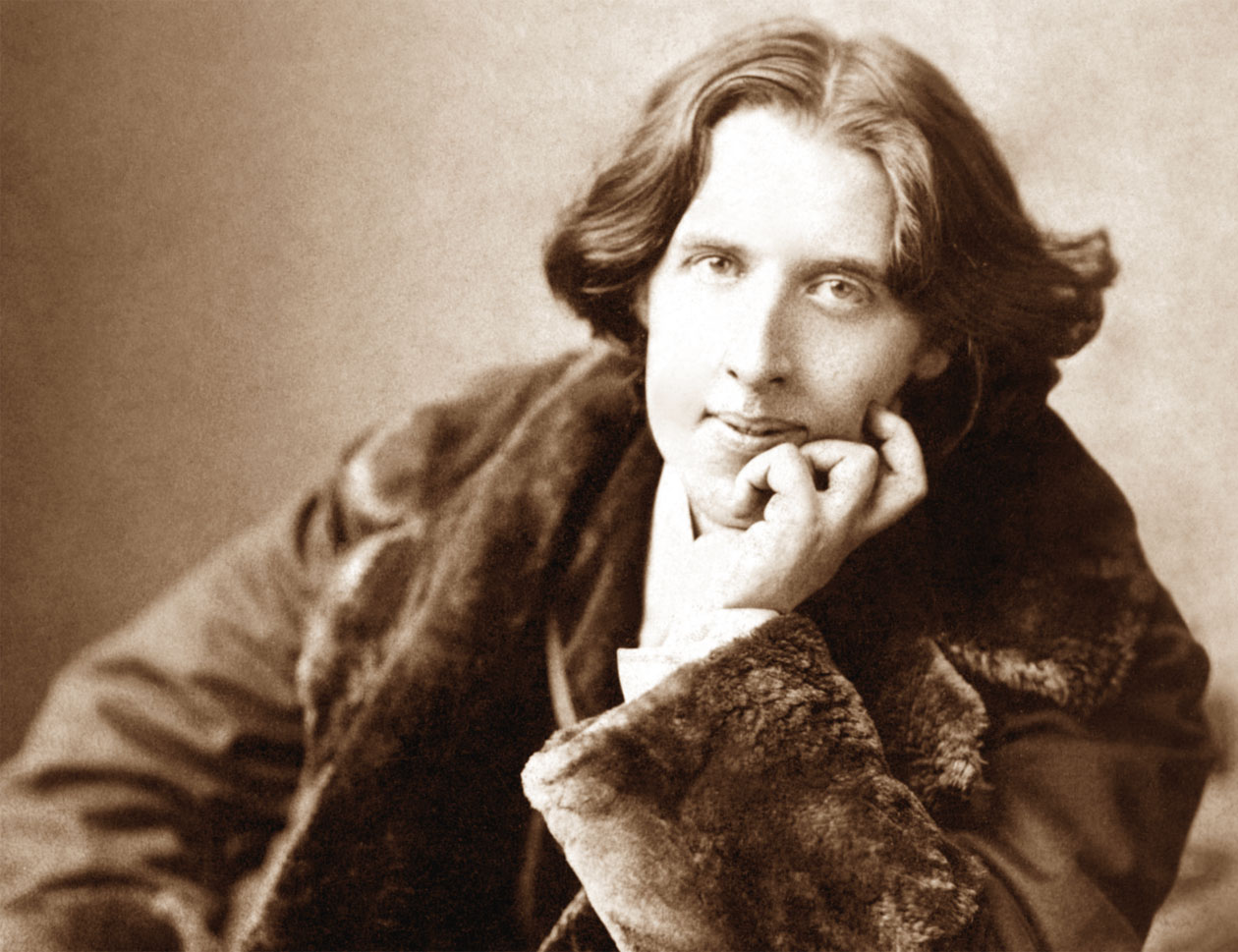
MEANING OF THE QUOTE:
"People tend to pay more attention to their negative
experiences and take their positive ones for granted."
COMPOSER
OFFENBACH
BLUEBEARD
BARBE-BLEU OVERTURE
Hermann Scherchen, Conductor
Vienna State Opera Orchestra


BLUEBEARD
COMPLETE
 |
|
From the History of Bluebeard, 1889
|
 |
| http://www.inbetween-shop.com/index.php?main_page=product_music_info&cPath=3_16&products_id=99 |
Offenbach's librettists Henri Meihac

and Ludovic Halevy,
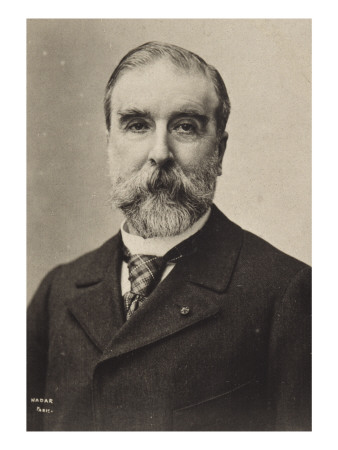
took a particularly sinister story
from a fairy tale (with the oldest
literary version of the story,
published in 1697) attributed to

and wrote an opera based
on it. Perrault's tale itself
originated from much
older oral folktales about a
bloodthirsty bigamist, Bluebeard,

who murders his brides before
moving on to new conquests.
 |
Yet, their interpretation of this story
in Offenbach's operetta has the
legend of the murderous knight
as a frivolous social farce:

"I am Bluebeard,"
sings the opera's central figure,
''Oh never was there a jollier widower.''
READ THE ORIGINAL STORY:
http://www.bilingualstoryworld.com/index.php?option=com_content&view=article&id=72:
bluebeard-barbablu&catid=82&Itemid=470
bluebeard-barbablu&catid=82&Itemid=470



WATCH THE ORIGINAL
STORY ON LINE:
1944 Movie Starring John Carradine
STORY ON LINE:
1944 Movie Starring John Carradine
VIEW THE ORIGINAL STORY
IN CARTOON VERSION:
BLUEBEARD PART 1
IN CARTOON VERSION:
BLUEBEARD PART 1
Grimm's Fairy Tale Classics

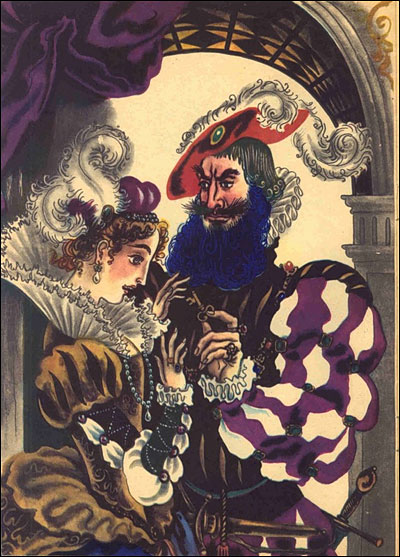

BLUEBEARD PART 2
Grimm's Fairy Tale Classics
THE BLUEBEARD STORY
 |
| http://gallica.bnf.fr/ark:/12148/btv1b90088365.r=.langFR |
AS TOLD BY OFFENBACH
http://www.archive.org/stream/bluebeard
00offegoog#page/n5/mode/1up
http://www.boosey.com/downloads/BarbeBleue.pdf
00offegoog#page/n5/mode/1up
http://www.boosey.com/downloads/BarbeBleue.pdf
 |
| http://www.sagamie.org/college_alma /2004/BarbeBleue.html |



INFORMATION FROM:
Duke Bluebeard,
a powerful and promiscuous
nobleman, lived in a mighty castle
 |
| Thomas Moran: Bluebeard's Castle, 1915 |
 |
| Franklin Booth: The Flying Islands of the Night, 1913 |
and had already done away with
five wives sequentially as he
quickly tired of them.



Bluebeard's leader, King Bobeche,
in a similar manner also made short
work of all the men who dared to
come close to his queen.
These two men are central to the
plot in which there are two parallel
stories running: one dealing with a
peasant girl's discovery that she is
actually a king's daughter and her
wish to marry a shepherd (who
conveniently turns out to be a prince
in disguise); the other is Duke
Bluebeard's decision to choose his
sixth wife (to replace the previous
ones who have mysteriously died)
via a lottery amongst the villagers.
Through the lottery, Boulette,
a distinctly middle-aged herdswoman,
(a regular country wrench) with a sharp
tongue, was chosen. Much to Bluebeard's
later displeasure, she was loudly
during a hand-kissing ceremony at Court.
At this event Bluebeard spied Princess
Hermia (the King's daughter) from afar and
he decided he wanted to make her his next
wife. However, before he could marry her
he had to dispose of his latest wife Boulotte.
 |
Alexis Joseph Perignon:
Hortense Schneider (Vocalist)
in the role of Boulotte from Bluebeard, 1866
|
To do that he instructed his right
hand man (an alchemist), Popolani,
to prepare a poisonous potion to
administer to her. The alchemist got
to work but provided a sleeping potion
instead as he didn't have the heart
to kill. Even though he convinced
Bluebeard that his new wife was
dead, she recovered
While still living in her
simple existence she met
and fell in love with a shepherd
named Bruno. Later, when Bruno
revealed that he was really a
Prince (his given name being
Prince Saphir), Hermia's parents,
King Bobeche and Queen Hortense,
gave permission for him to
marry their daughter.
When Baron Bluebeard
 |
| http://salr.ca/evenements/barbe-bleue-de-jacques-offenbach/ |
heard of this he surrounded the
King's palace with troops. The
Prince, after challenging Bluebeard
to a duel, was then apparently killed.
 |
| http://www.offenbachgravurespresse.blogspot.com/ |
Now, Princess Hermia was about to agree
to become Bluebeard's seventh wife
 |
| Benjamin Lacombe: Barbe Bleue |
when Boulette,


unafraid of any man,
returned; Bluebeard had
found out that Popolani had only
pretended to do away with her. She
confronted Bluebeard, with his
previous wives in attendence,
in front of the whole Court.
In total embarrassment and filled
with remorse, Bluebeard was
reconciled to Boulotte.
 |
| http://www.offenbachgravurespresse.blogspot.com/ |
The King, who thought
his Prime Minister, Count Oscar,


had executed, on his orders, the
Queen's ex-lovers, was astonished
when they also made their appearance
at Court. They too had been in hiding
and soon found partners among
the ex-wives of Bluebeard.
In conclusion, Princess
Hermia discovered
happiness at last
finding out that Prince
Saphir had not been killed
but merely stunned.



BLUEBEARD
(BARBE-BLEUE)
Part 1
Marcel Cariven, Conductor
Choirs and Orchestra of the RTF, 1958

A BLUEBEARD STORY
TOLD THROUGH POETRY
Sonnet VI
BLUEBEARD






This door you might not open, and you did;
So enter now, and see for what slight thing
You are betrayed....Here is no treasure hid,
The sought-for truth, no heads of women slain
But only what you see....Look yet again--
An empty room, cobwebbed and comfortless.
Yet this alone out of my life I kept
Unto myself, lest any know me quite;
And you did so profane me when you crept
Unto the threshold of this room to-night
That I must never more behold your face.
This now is yours. I seek another place.




LINKS
http://michelinewalker.com/2013/06/14/bluebeard-motifs-suspense/
http://www.musicweb-international.com/classrev/2009/Oct09/Offenbach_Bluebeard_101293.htm
http://www.arkivmusic.com/classical/Name/Peter-Foltz/Performer/155200-2
http://www.abt.org/education/archive/ballets/bluebeard.html
http://www.offenbachgravurespresse.blogspot.com/
PICTURES OF BLUEBEARD




http://www.musicweb-international.com/classrev/2009/Oct09/Offenbach_Bluebeard_101293.htm
http://www.arkivmusic.com/classical/Name/Peter-Foltz/Performer/155200-2
http://www.abt.org/education/archive/ballets/bluebeard.html
http://www.offenbachgravurespresse.blogspot.com/
PICTURES OF BLUEBEARD






 |
| Kate Greenaway: Bluebeard, 1871 |
